Celebrating 30 Years of SNAP-Ed
go.ncsu.edu/readext?948346
en Español / em Português
El inglés es el idioma de control de esta página. En la medida en que haya algún conflicto entre la traducción al inglés y la traducción, el inglés prevalece.
Al hacer clic en el enlace de traducción se activa un servicio de traducción gratuito para convertir la página al español. Al igual que con cualquier traducción por Internet, la conversión no es sensible al contexto y puede que no traduzca el texto en su significado original. NC State Extension no garantiza la exactitud del texto traducido. Por favor, tenga en cuenta que algunas aplicaciones y/o servicios pueden no funcionar como se espera cuando se traducen.
Português
Inglês é o idioma de controle desta página. Na medida que haja algum conflito entre o texto original em Inglês e a tradução, o Inglês prevalece.
Ao clicar no link de tradução, um serviço gratuito de tradução será ativado para converter a página para o Português. Como em qualquer tradução pela internet, a conversão não é sensivel ao contexto e pode não ocorrer a tradução para o significado orginal. O serviço de Extensão da Carolina do Norte (NC State Extension) não garante a exatidão do texto traduzido. Por favor, observe que algumas funções ou serviços podem não funcionar como esperado após a tradução.
English
English is the controlling language of this page. To the extent there is any conflict between the English text and the translation, English controls.
Clicking on the translation link activates a free translation service to convert the page to Spanish. As with any Internet translation, the conversion is not context-sensitive and may not translate the text to its original meaning. NC State Extension does not guarantee the accuracy of the translated text. Please note that some applications and/or services may not function as expected when translated.
Collapse ▲This past year, Supplemental Nutrition Assistance Program – Education (SNAP-Ed) celebrated 30 years of providing evidence-based nutrition education and obesity prevention initiatives to SNAP recipients in the U.S., Guam and the Virgin Islands. By providing direct education, multi-level interventions, and community/public health approaches to communities, they have helped to improve the nutrition knowledge and health of historically low resource populations. This federally funded grant program has impacted many lives for three decades and continues to make waves of change today.
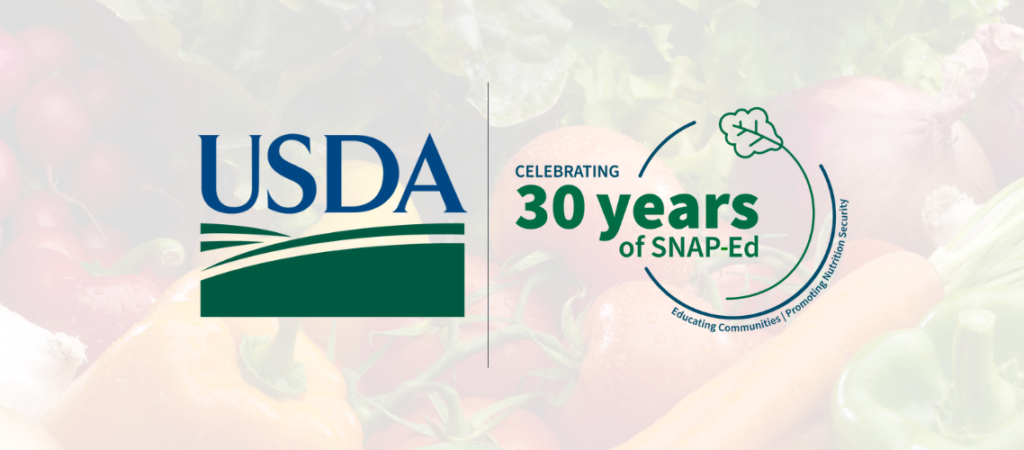
Celebrating 30 years of SNAP-Ed in 2022
In 2007, SNAP-Ed found a home at NC State University and Steps to Health began. By connecting county-based extension agents with campus-based faculty and staff from the Agricultural and Human Sciences Department, the University started its very own SNAP-Ed program. In turn, the Steps to Health program has been able to develop and deliver evidence-based direct education for the last 15 years. Direct education has been a large part of Steps to Health’s work in the communities of NC and the program remains dedicated to supporting county agents as they conduct programs around the state.
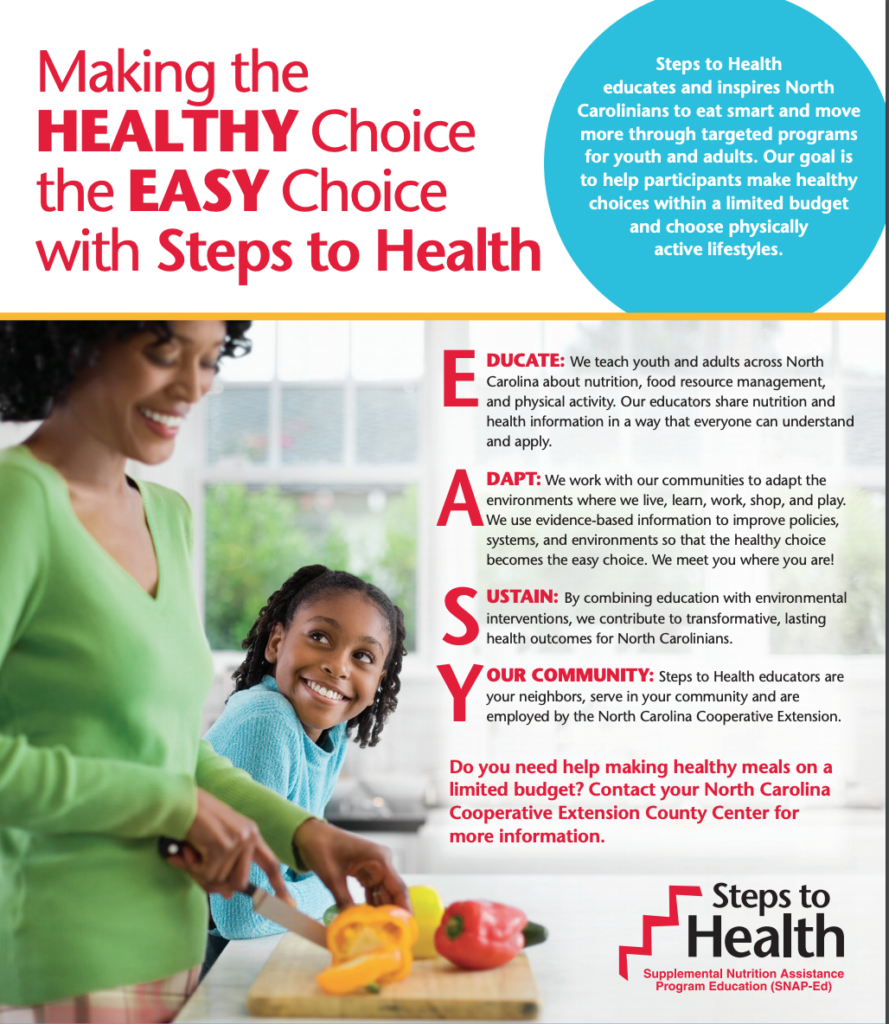
Steps to Health Social Marketing Advertisement
Steps to Health, offers six direct education programs. Four of these programs are dedicated to youth participants, and two programs are dedicated to adult participants. Color Me Healthy serves young participants in Pre-K & Kindergarten. The curriculum focuses on introducing little ones to healthy eating habits and ways to practice physical activity. Steps to Health also offers a curriculum for 2nd-Graders, and a separate STEAM program for 3rd-Graders with more hands-on activities. The new 3rd-Grade STEAM program is set to launch during 2023.
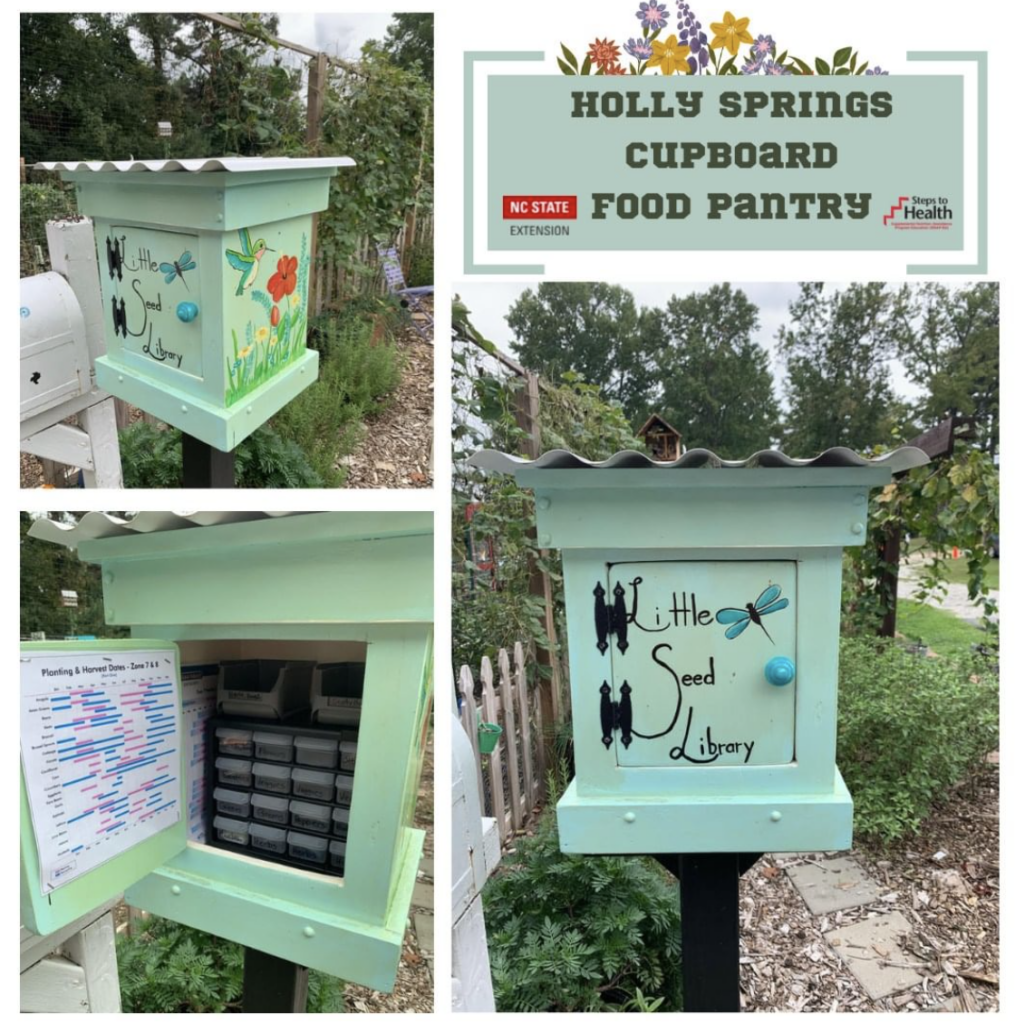
Little Seed Library at Holly Springs Cupboard Food Pantry
Kids Club, our youth program dedicated to grades K-5th Grade, serves all elementary aged children and focuses on physical activity and nutrition education by giving the participants interactive activities and games for outside and indoors. Kids Club programs usually take place in or around Afterschool Programs, Boys & Girls Clubs and USDA Summer Food Service sites. Like all Steps to Health programs, Kids Club participants are given certificates and educational extenders connected to the curriculum that reinforce the weekly lessons.
Steps to Health serves adult participants by offering Take Control and Faithful Families Thriving Communities to NC’s SNAP-eligible adults. Take Control is an eight session chronic disease prevention program that provides strategies to help adults manage their health. Take Control programs can be taught at community centers, low-income housing communities, senior centers and more. Faithful Families Thriving Communities, is solely dedicated to faith-based organizations, such as churches, mosques, and synagogues. Together, these two adult programs provide SNAP-eligible adults with nutrition education on behalf of Steps to Health, across the state.
During the COVID-19 Pandemic, Steps to Health developed remote learning tools to reach SNAP-Ed participants who couldn’t meet in-person with Extension Agents. The Steps to Health team responded to this swift change by converting several programs to online resources. The Color Me Healthy, 2nd/3rd Grade, and Take Control programs took center stage as Steps to Health officially became a hybrid program, serving participants both in-person and virtually.
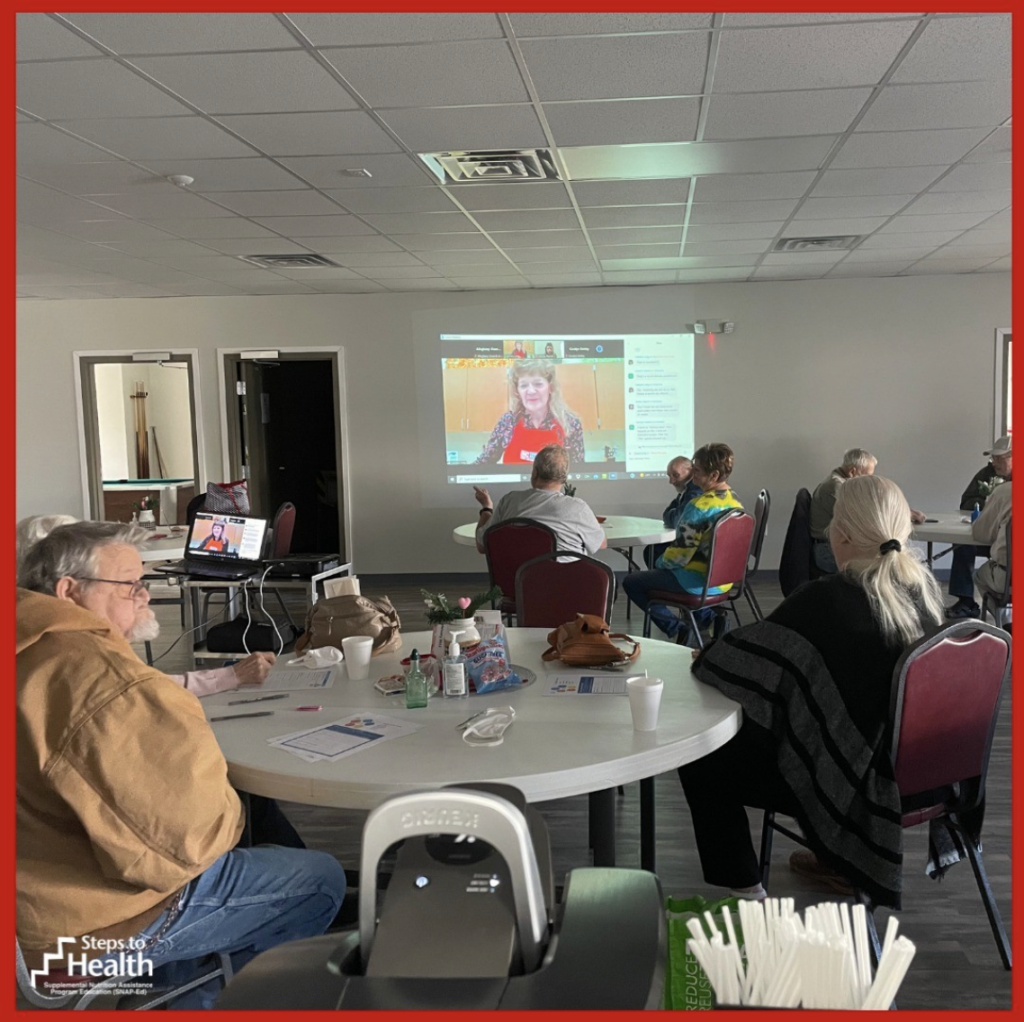
Virtual Take Control Class
During this conversion to online education, the Steps to Health team and its partners pulled together to create cohesive online modules. Campus-based staff members, faculty and extension agents collaborated to record and post lessons for Color Me Healthy, 2nd/3rd Grade, and Take Control. Over the last three years of the global pandemic, the Steps to Health team has been able to use online education, social marketing and social media to reach even more SNAP-eligible folks around North Carolina.
Along with programming based in direct education, other initiatives like PSE have been implemented to improve communities for years to come. Steps to Health has developed toolkits that give Extension professionals a roadmap to improving the overall health of the communities they serve.
Policy, Systems & Environmental Change (PSE) is another layer of Steps to Health’s contributions to the communities of North Carolina. NC State Extension professionals help facilitate initiatives to create long standing changes in communities to help make the healthy choice the easy choice for low-income families and individuals. PSE projects focus on creating community gardens, walkable trails & sidewalks, nutrition-based signage and much more.
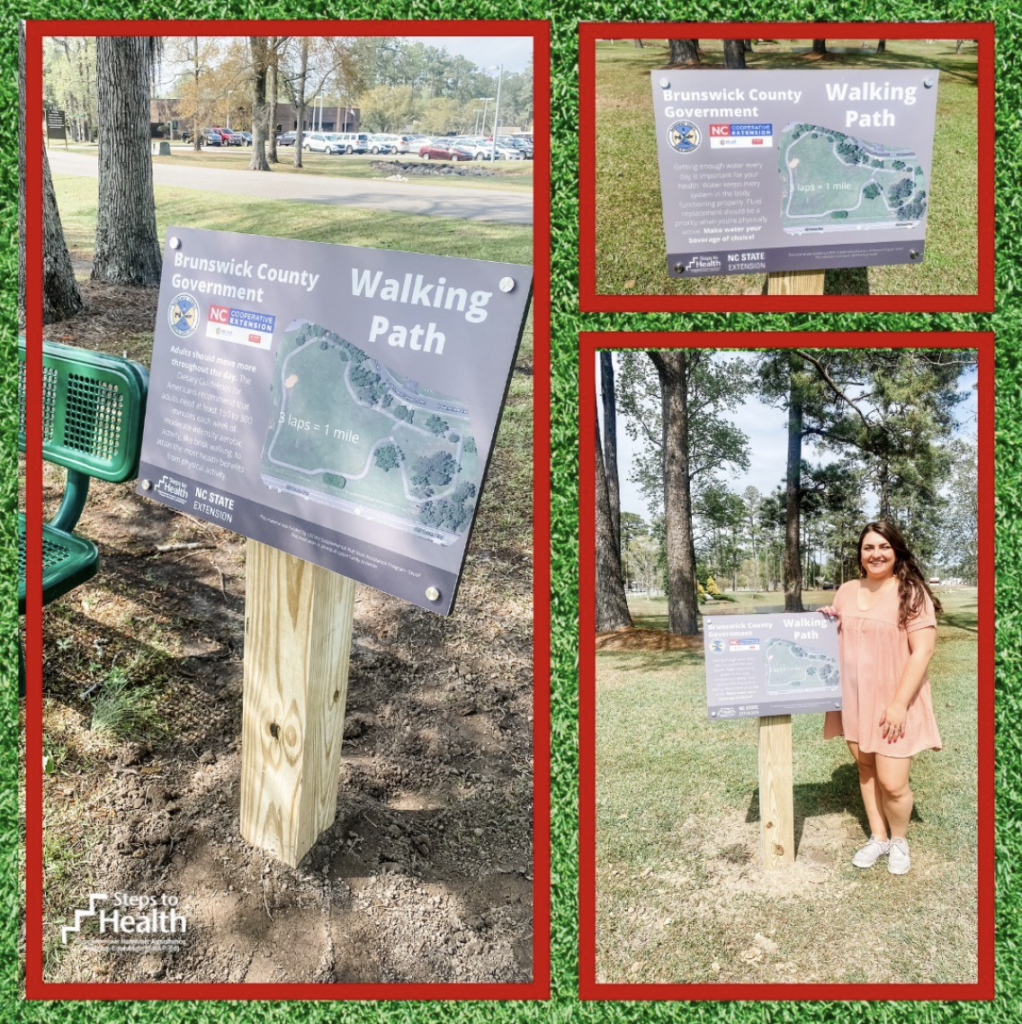
Steps to Health is dedicated to inspiring healthier communities by shaping the environments where limited-income individuals buy, cook, and consume food. Through PSE efforts, Steps to Health can serve many different settings, including community sites, farmers’ markets, food pantries/food banks, schools, and food retail stores. Three of these toolkits were also selected to be on the National SNAP-Ed Toolkit website. The resources that were chosen are:
- The Ingredients for a Welcoming Farmers’ Market
- The Nuts and Bolts of a Healthy Food Pantry
- Communities Moving Together — A Guide for Facilitating Community-Led Walk Audits
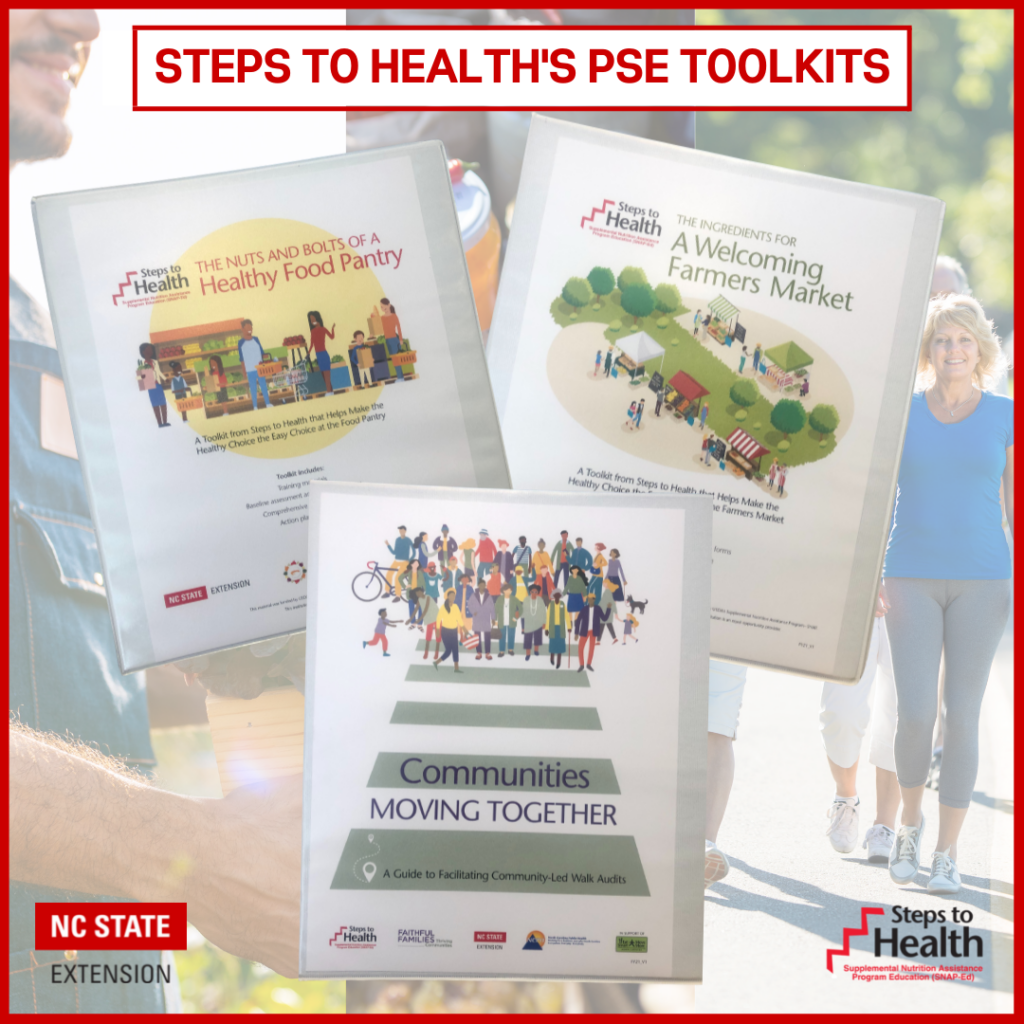
Steps to Health PSE Toolkits
The Steps to Health team also enjoys working alongside EFNEP. The EFNEP team is based on campus and they have EFNEP educators in various counties across the state working to help participants learn skills and strategies to feed their family nutritious meals on a limited budget. Both programs work to achieve common goals throughout the communities of North Carolina. At the onset of the pandemic, the two teams collaborated to distribute 102,000 recipe and nutrition information card decks to food banks, food pantries, and other emergency food distribution sites around the state. The team has also created social media content to accompany its ever growing hybrid model of direction education.
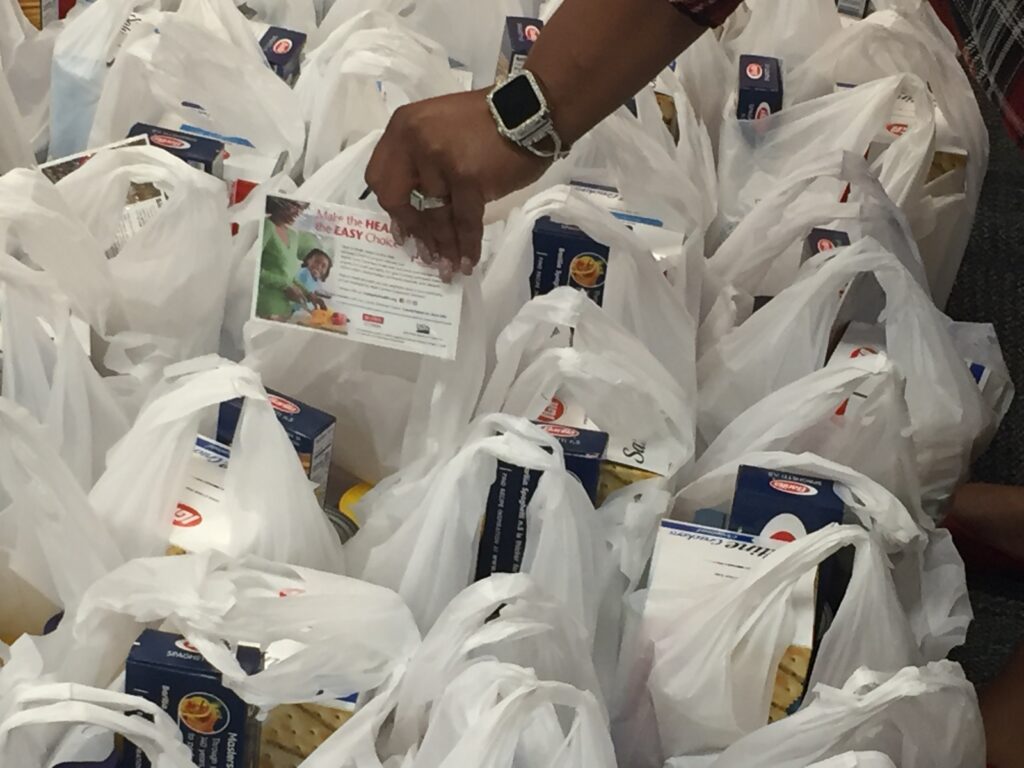
Steps to Health/EFNEP Recipe Card Deck Distributio
Steps to Health can be found on Instagram, Facebook, Twitter and Youtube at “NCStepstoHealth”. Our online content is dedicated to supporting program participants with recipes, budgeting information, and tips on how to build healthy habits. In 2020, the team launched Steph and Ned, a video series that offers information about fruits, vegetables, whole grains, physical activity, smart goals and eating mindfully. In 2023, Steps to Health will be launching a social marketing text campaign to reach more participants. Feel free to join our social media feeds and view Steph and Ned on our YouTube page.
In 2023 and beyond, Steps to Health is dedicated to helping make the healthy choice, the easy choice. The campus-based staff continues to expand the Steps to Health curricula and tools, while bridging new connections and providing resources to those working to better the health and nutritional security in communities around North Carolina.


